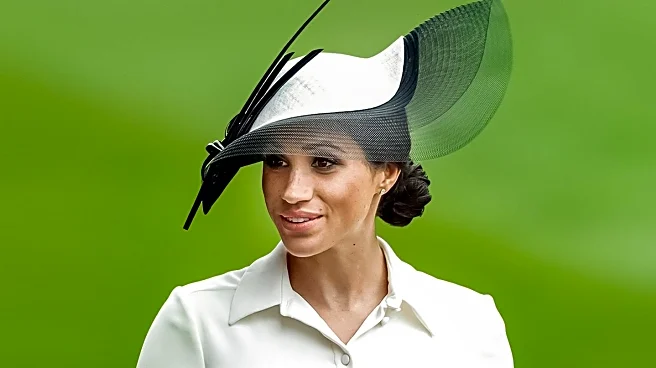What's Happening?
The Duchess of Kent, Katharine, passed away at the age of 92, as announced by Buckingham Palace. She died peacefully at Kensington Palace, surrounded by her family. Known for her dedication to various charitable causes, the Duchess was a beloved figure in the British royal family. Her contributions included volunteering at the Passage night shelter for the homeless and serving as an ambassador for UNICEF. She was also recognized for her involvement in the Wimbledon tennis tournament, where she presented trophies and offered consolation to players. The Duchess was the first royal to convert to Catholicism in over 300 years, marking a significant personal decision in 1994. Her passing has prompted a period of royal mourning, with the Union Jack at Buckingham Palace lowered to half-mast.
Why It's Important?
The Duchess of Kent's death marks the end of an era for the British royal family, highlighting her role as a compassionate and dedicated royal. Her work with charitable organizations and her influence in the world of music and sports have left a lasting impact. Her conversion to Catholicism was a notable event in royal history, reflecting her personal convictions. The mourning period signifies her importance within the royal family and the respect she garnered from the public. Her legacy continues through the charitable initiatives she supported, such as Future Talent, which aims to provide children with opportunities in music.
What's Next?
The royal family will observe a period of mourning until the Duchess's funeral, with details yet to be announced. During this time, members of the royal family and staff will wear specific mourning attire, and troops on public duties will don black armbands. The funeral arrangements will likely involve significant figures from the royal family and possibly representatives from the organizations she supported. The public and royal watchers will be keenly observing the proceedings, reflecting on her contributions and the impact she had during her lifetime.
Beyond the Headlines
The Duchess's life and work highlight the evolving role of royals in modern society, where personal convictions and charitable work can redefine traditional expectations. Her conversion to Catholicism and her dedication to music education through Future Talent demonstrate a shift towards more personal and impactful engagements by members of the royal family. Her legacy may inspire future generations of royals to pursue similar paths of service and personal expression.









